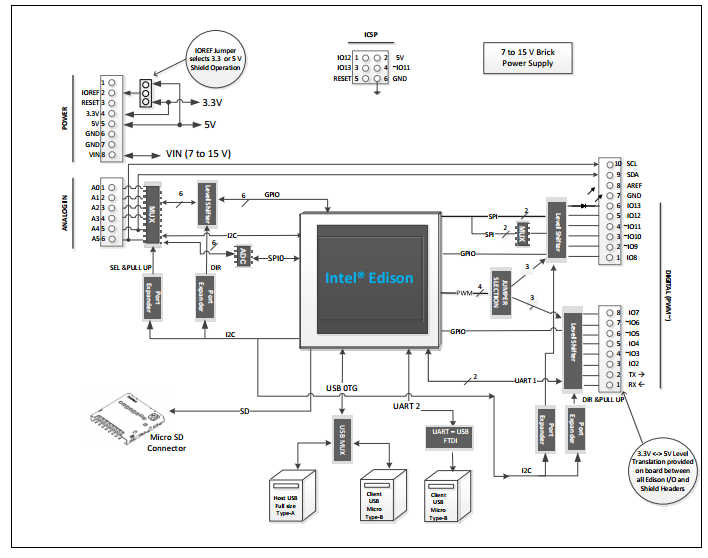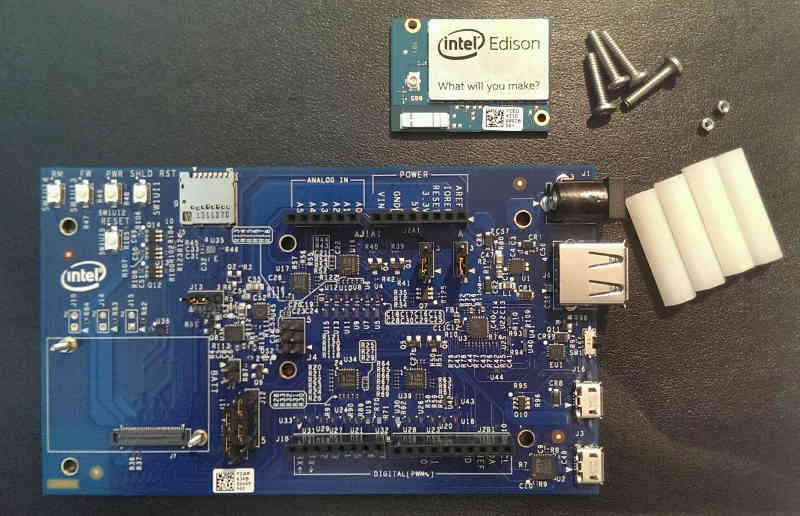| Intel's New Edison Is As Small As A Postage Stamp |
| Written by Harry Fairhead | |||
| Monday, 15 September 2014 | |||
|
It is difficult not to see the Edison and think "Arduino killer" and perhaps for some applications "Raspberry Pi killer". In fact it has a place in the low cost tiny system ecology all of its own. The Edison is the first in a family of devices that Intel is targeting at the growing IoT market. The Edison was announced at the start of this year, but now you can actually buy the device and there are modules available to expand it.
This is the smallest and cheapest of the family but it has a lot of power for its $50 cost: The Intel Edison module uses a 22-nm Intel® Atom™ SoC, formerly Silvermont that includes a dual core, dual threaded CPU at 500 MHz and a 32-bit Intel® Quark™ processor MCU at 100 MHz. It supports 40 GPIOs and includes: 1 GB LPDDR3, 4 GB EMMC, and dual-band WiFi and Bluetooth® Low Energy Notice the important points - you get WiFi and Bluetooth as standard and this makes it cheaper and more powerful than a similarly equipped Arduino. it uses one of its two cores to run a realtime OS that deals with the I/O and the other core runs the standard OS - at the moment Linux. Compared to a Raspberry Pi it lacks video and keyboard. The range of I/O lines available are compatible with the Arduino Uno, i.e. 20 I/O lines, 6 analog inputs, 1 UART and 1 I2C. Four of the pins can be used for PWM. At the moment you can write programs using Arduino wiring and C/C++. Promised for the future are Python, Node.js, RTOS and Visual Programming. As to being the size of a postage stamp, it is actually an SD card form factor. To program and generally make use of it you need to plug it into an Arduino Expansion board. It connects to the Expansion board via a 70-pin connector and this raises the cost of getting started to $99.
The expansion board not only provides power but also the USB connection needed to program the device and a small breadboard area. For most prototyping applications you are going to need both the expansion card and the Edison which means the Edision on its own isn't quite the equal of the Arduino.
Its features are:
There is also a mini-expansion board that doesn't use an Arduino layout which lowers the getting started cost to $75. It has:
To sum up, for most one-off applications you are not going to get away with just an Edison - you are going to need some expansion unless you are prepared to wire to the 70-pin connector. Connectors are available but they don't look like an easy-to-use option for prototyping. SparkFun already has a range of add-on blocks for the Edison. For example, its starter kit has an Edison, a Console block providing power and USB, a GPIO block providing access to the I/O and a battery block that has a 400mah rechargeable battery. The starter kit cost $114 and the blocks can be bought separately. Sparkfun also has a range of sensors and driver boards.
The Edison seems to sit quite nicely between the Arduino and the Raspberry Pi - it has its place. More InformationRelated ArticlesIntel Inside - The Arduino Galileo ArduinoDroid - An Arduino IDE for Android
To be informed about new articles on I Programmer, install the I Programmer Toolbar, subscribe to the RSS feed, follow us on, Twitter, Facebook, Google+ or Linkedin, or sign up for our weekly newsletter.
Comments
or email your comment to: comments@i-programmer.info
|
|||
| Last Updated ( Monday, 15 September 2014 ) |




